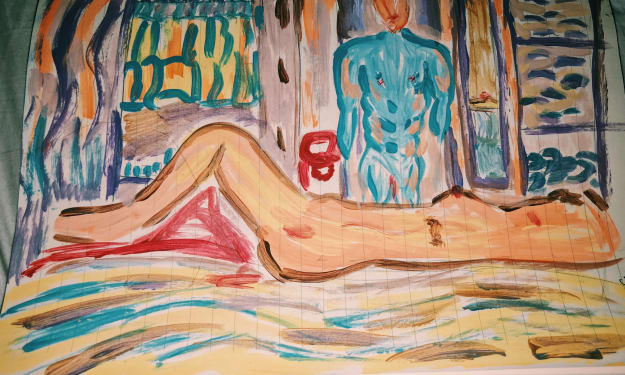Taylor Swift's Semantic Fields in 'Reputation': Part One
Islands

When I first downloaded all of Reputation, I spent the morning skipping through songs, finding one that I thought I may like. At first I was kind of worried because I only liked one or two songs, but as I listened to the lyrics more, slowly, and one by one, each song became one that I must sing along to in the car and can't seem to get myself to willingly escape. This happens for me a lot when first listening to an album because I'm always looking for new music, but hate the process of getting acquainted with the lyrics of the song. I just want to be able to sing along to it immediately, figure out all the hidden messages, find where songs link together in albums, songs hinting at other songs, mirroring previous number one hits and so on. But appreciation takes time, and it was only a matter of time until Reputation became a verbal example of concepts learned and discussed in my 400 level creative writing classes.
Early on in the creative writing major, they make sure to strip you of your old habits, writing things such as "beautiful," "pretty," and "hate," which are things that are so abstract, we all know what it feels like, but those words don't appeal to your five senses when reading, and that is what writing should do. So your professors take those words out of your vocabulary, they make you re-write pieces until you are turning in a piece with "concreteness," meaning all the words you are using are appealing to your five senses. Sometimes a writer can get away with using abstract language, but it has to be rescued by concreteness. I'll explain that in later posts.
As you go on in the Creative Writing world, you learn the differences and the power of simple words such as "you," (which is a very lonely and isolating word) and "I" (whose meaning and subject can change the minute the word gets placed in front of someone else's eyes). The simple language seems to get complicated, and they teach you how to create hints, references and feelings in the reader (or in this case listener) from story to story, song to song and piece by piece.
One of the ways that a writer links together seemingly unrelated stories, poems, pieces or songs is through semantic fields. A semantic field by definition is a lexical set of semantically related items. To break it down further; it is a set of words that are grouped semantically (by meaning) that refers to a specific subject. One way that I did this in a creative writing project was when we were told to look at three different industries. So I looked at working in retail, the alcohol industry (and its effects in my life), and the controversies of the church during election year. Then, during pieces, I took language that had a reference back to animals, anatomy, and technology. This took three completely different industries and pieces, and undeniably linked them together to create one portfolio.
Taylor Swift does this in Reputation.
Multiple times.
Over the course of her whole album, and in EVERY song.
There is language taken from islands, the colors gold, blue, and red are mentioned multiple times describing multiple things, and sometimes linked in relation to Joe Alwyn's eyes, which are also mentioned or suggested in multiple songs. Neutrals are sprinkled throughout the whole album, as well as some songs have mentioned acts of crime or being in trouble. Modes of transportation are also mentioned, and almost every song mentions drinking of some sort, but when she points out a specific drink, no other song has that drink mentioned, as well as the idea of some sort of game laces itself throughout the album. Language that pertains to royalty or ruling a type of kingdom are mentioned throughout the whole album. And the final semantic field is sex, which there is a nod to in almost every song.
ISLANDS
Starting with "Ready For It," (the first song on the album) Taylor mentions islands right off the bat in the pre-chorus, which is repeated multiple times in the song: "I-island breeze, and lights down low..." and then the second verse comes around and it is mentioned again "... and we'll move to an island, and and..." suggesting some secret island getaway between just the two of them, and then she asks, "are you ready for it?" Perhaps asking, are you ready to take on my reputation along with me?
In the second song of the album, "End Game," which was also a single released, there is more language taken from the theme of Island. "I don't wanna hurt you, I just wanna be, drinking on the beach with you all over me." Obviously a beach is found on an island. This may be alluding to the same escape from "Ready For It." In the same song, Ed Sheeran says "rumors are knee deep" which is a metaphor for being in rising water/ocean. As well as in Taylor's final verse she says, "I burry hatchets, but I keep maps of where I put 'em." Two things are going on when she says this. The first thing is that writers often try to take things that are cliché and break them. Meaning they take the cliché and change it so you get that familiarity of something that is so overused, but there's suddenly more concreteness behind it (such as keeping maps of buried hatchets), something new, and it paints a different picture rather than hearing the same cliched phrase that you would hear all the time. Clichés aren't deep, they are overused and need to be broken. So the cliché is obviously burying the hatchet, like you would bury a treasure on an island (as told in most stories) and actually burying a hatchet is a commonly overused phrase but she takes this cliche and turns it into something not everyone wants to address or think about when they say "let's bury the hatchet." Taylor saying she's keeping maps of where they put them meaning she's willing to move on as long as everyone else is, which breaks the cliché saying "I'm moving on, but I'm keeping a book mark of this issue so I can easily come back to it if nobody else really drops." Burying something with a map alludes to the analogy of a treasure and a map, which are things typically dealing with islands. The treasures always buried on a mysterious island right!? (Unless you're in National Treasure I guess...)
Her fourth song on Reputation says, "the darkest little paradise," which is a reference to a night in her bedroom, but also paradise is the language typically used to describe an island. "I once was poison ivy, but now I'm your daisy," which are references to the language of plants that could easily be found on islands. Ivy and flowers.
We then skip over two of her released singles, and probably one of the most sexually charged songs on Reputation, "So It Goes..." (but they will appear with other semantic fields) and go right into "Gorgeous," which isn't her best song on the album, but I've always felt like it was that song that points out how crazy we get with innocent little crushes, and it makes fun of herself in the song, and it's a song that almost makes fun of the music culture of our generation. Again, I could go into a whole other post... But "Gorgeous" hits the semantic field of Islands when she is describing Joe's eyes saying "ocean blue eyes looking in mine, I feel like I might, sink and drown and die." Once again, language that would be found in relation with an island, when she's describing that feeling of seeing the guy you like, your eyes meeting and you're suddenly all nervous and jittery and just want to run and hide.
In "Get Away Car" she goes back to the analogy of her keeping maps saying "X marks the spot." And then "Dancing With Our Hands Tied," says "baby can we dance, through an avalanche?" Which when people think of an avalanche, they think of snow, but mud avalanches exist, especially when there's a lot of rain, or a storm (see "Call It What You Want" for more storm references). As well as another reference to water rushing, and deep fears in "Dancing With Our Hands Tied."
We skip (my favorite song) "Dress," and go right to "This Is Is Why We Can't Have Nice Things" where she mentions seas which, by definition, seas are enclosed by land; however, people use them interchangeably saying they're "on the open seas" when referring to an ocean. So this may be a stretch, but it is still referring to a large body of water which, in the language of our culture, is often misconstrued to be interchangeable for an ocean, which is something that usually surrounds an island.
In "Call It What You Want" Taylor mentions flowers and a storm once again, saying "all my flowers grew back as thorns, windows boarded up after the storm, he built a fire just to keep me warm." Again, all things that could be found on an island. Island storms, building fires, flowers and thorns." I also find it interesting when she says, "holding my breath, slowly I said..." When holding your breath is not just something you do when you're nervous, or bringing up a sensitive subject, but it also something you do when you're going swimming.
Looking at all these subtle things in the language, you may not catch it at first—some of the things I didn't even realize were in there until I went through all the lyrics song by song. But these songs are undeniably linked together by their language, though touching on different subjects such as Taylor's reputation, saying that it is what it is and it's a lot to live with, asking someone if they can take on her reputation as well, she touches on nights with her lover, seeing him for the first time, secret meetings, the moments when her reputation was being destroyed, the anxiety knowing that the world could greatly destroy something you love, and then watching it happen. Islands are used innocently, and as acts of destruction or danger within this album, and is only ONE thing that links all these songs together and makes this an album with drastically different music, tempos and themes, but also probably her most cohesive album yet.
About the Creator
Bella Harris
There's something about a woman with a loud mind that sits in silence, smiling knowing she can crush you with the truth. R.g. Moon







Comments
There are no comments for this story
Be the first to respond and start the conversation.